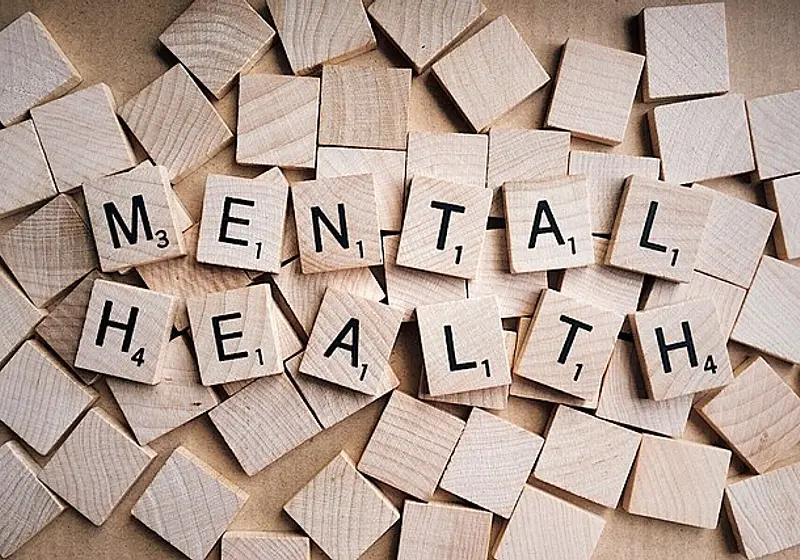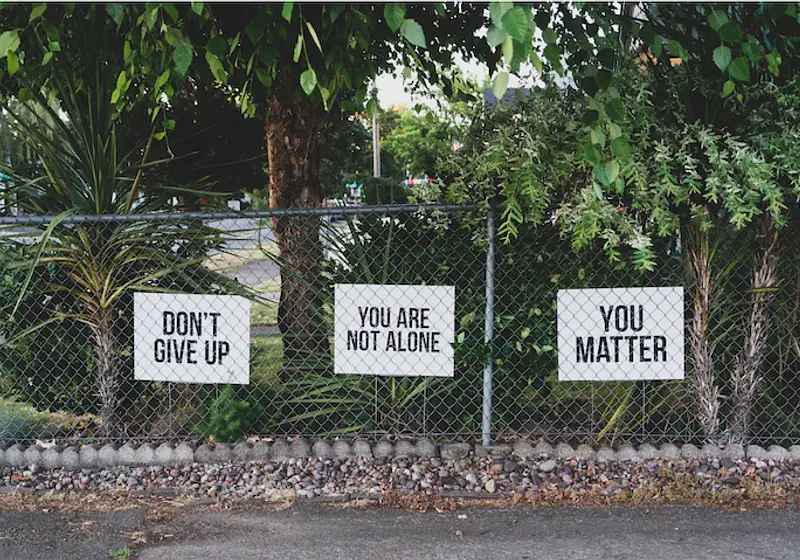Do you ever get really sad, to the point where it goes on for weeks or months? Do you ever struggle with your self-image? Do you ever struggle with mental health and need help? Do you ever struggle with asking for help?
If you answered yes to any of those questions, this article is for you. Throughout this article, we will be going through ten tips to help with your mental health.
Mental health is such a huge thing that can affect anyone. Mental health is a condition regarding one's psychological and emotional well-being. Many people struggle with mental health: men, women, and even children. It can take a toll on anyone and may cause problems based on which mental illness goes on.
Here are ten ways to better help your mental health.
Let us slide into your dms 🥰
Get notified of top trending articles like this one every week! (we won't spam you)Have A Routine
Having a routine is crucial. A routine not only keeps you in check, but it helps reduce stress and build healthy habits. Having stress can put you at risk for heart disease and nobody wants that.
Having a routine will reduce stress because you have things in order and check. With a routine, you lessen the anxiety and it gives you more time to relax.
Not only do routines help reduce stress, it causes you to sleep better. With a routine, you have more energy to do things, especially after a good night's sleep. Having a food routine is also good because writing down times to go grocery shopping will help you reduce eating all that fast food, allowing you to be healthier. Having your routine on what you’re going to do each day is good for you as well as overall enhancing your health, mental and physical.
Take the Quiz: Are you "Delulu"?
Are you grounded in reality, or letting your overthinking run the show?
Exercise
Exercising is amazing not only for your physical health but for your mental health as well. Exercising also reduces stress, helps you sleep better, and lessens mental illnesses. Working out each day gives you confidence in yourself to do almost anything.
Exercising boosts your memory through neuroplastic alterations. Exercising helps reduce depression and anxiety. Not only that, it also helps one lose feelings of isolation and loneliness. Given this fact, it forces you to go places and see people. It also improves your concentration.
Sticking with exercising allows you to up your energy based on the exercise you do and for how long. Exercising sends endorphins and serotonin to the brain. Those amazing feelings improve your mood.
When you exercise, you get into shape, and getting into shape can make you feel good about yourself. Exercise also improves your mood, as well as diminishes any negative thoughts about yourself.
Stay Sober
Avoiding alcohol, weed, and drugs helps your mental health. When you're drunk or high you receive high emotions; some happy, some uplifting, but most sad, mad, or down. With this, it can affect your mental health.
Some people go so far as to abuse substances that can cause major anxiety, depression, and or borderline personality disorder. Substance abuse is along with antisocial, bipolar, psychotic, and more.
Staying sober can help you feel and look healthier. Staying sober allows your body to heal and look good. You will have greater immunity as your body won’t have to fight any bad substances off.
You will have better relationships with your loved ones that will make you feel better about yourself. The attention that was on all drugs and alcohol is now on yourself and your loved ones, which is where it should be. Being sober will decrease your mental illnesses and keep you in check. It will reduce your stress to the point where you feel better. While smoking weed gives a lot of people anxiety, causes hallucinations, and causes one to be paranoid, staying sober can prevent all of those things.
Limit Social Media
Social media is a huge piece of our lives that can affect one's mental health. Using social media for longer than a few hours a day can change your brain and not in a good way. It causes gray matter in the brain.
Social media is designed to be addictive and causes mental illnesses such as depression and anxiety. According to the Pew Research Center, 69% of adults and 81% of teens in the U.S. use social media. This is a lot, which is okay to a point. It gets worse when people spend hours and hours on it. This causes people to feel sick over social media.
Why do people still use it if it makes them feel that way? It’s the thrill they get, with all the likes, comments, and attention. Craving these things on social media can damage our mental health.
If you don’t get as many likes as the person next to you and you crave more and you just never get them it, can destroy you. As this cycle keeps going, you keep becoming more devastated until the point where you become depressed. With comments, people can do whatever they like. People can call you names, and say horrible things, which can also cause depression. For social media, I wouldn’t get rid of it completely because it's how most people communicate with each other: I would limit it. An hour or two a day is what I do, but the recommended time for social media is thirty minutes. Can you imagine that? Most people spend five hours on social media a day. That's crazy!
Get Sleep
An adequate amount of sleep is something that we all need for us to be healthy. Sleep can affect us physically but also mentally and emotionally. Lack of sleep has been linked to depression, bipolar, anxiety, and more mental illnesses.
Mental illnesses make it harder for us to sleep, which is ironic since we need sleep to help our mental health. Poor sleep such as insomnia can worsen our mental health. Each different stage of sleep is connected to the health of the brain. REM sleep is the process of emotional information. During sleep, the brain works to remember things, such as memories and thoughts. Obstructive sleep apnea, which breaks your breathing when you sleep, is also connected to our mental health.
Research shows that poor sleep can also lead to depression. Staying up late due to watching TV or being on your phone for more than a few days can put you in a grumpy or depressed mood. Poor sleep leads to depression and having depression leads to poor sleep and depression can become a horrible loop that is hard to get out of.
Anxiety can keep you awake at night, causing you to lose sleep. The more anxiety, the more fear and worry, and the more problems caused due to little sleep. The bipolar disorder happens when episodes of very extreme moods high (mania) and low (depression) go on. People with bipolar have messed up sleep patterns depending on their emotional state. With mania episodes, people may not be able to sleep, and depending on the depression episode, they may sleep too much or very little.
Getting enough sleep can reduce depression, lessen anxiety, and keep you healthy.
Surround Yourself With Uplifting People
You might not think it is an important thing, but it is. Surrounding yourself with happy, uplifting people, who have goals, have routines, and do things to help their mental health, can help you as well. If you’re hanging out with these types of people, you are most likely going to pick up on their habits and do them yourself.
It's the same if they were bad habits: you are most likely to follow those as well. The difference is you want the good habits -- the ones that will make you a better person.
You want people who are going to lift you, help you, love you, push you to do better, and care for you. If you’re with those people, you will believe in yourself and go far. You will reach your goals and your lifelong dreams with just a little more boost from your loved ones. Having these people around will also boost your mental health and you will have more confidence in yourself.
Do Things You Like
If you have depression, it can be hard to do things you like at times. Maybe you enjoy reading. Pick up a book and read a page or a chapter, trust me you’ll feel a little better that you accomplished something.
Do you like to write? Write a poem about how you are feeling. Getting it down and then reading it back to yourself may help too. Playing sports? Go outside for thirty minutes and shoot some hoops. Being outside in the sun and moving actively will benefit you. Doing the things you like brings enjoyment and as said before it may be hard but just doing a small something that you like can bring a little bit of that enjoyment back. Baby steps, they say, baby steps.
Practice Gratitude And Affirmations
Practicing gratitude and affirmations can better help your mental health by reducing self-hate, depression, and anxiety. Gratitude, writing down what you are grateful for, can make you feel better about yourself. Practicing affirmations can also make you feel better about yourself when you are telling yourself you’re “good enough,” “you’re awesome,” etc. Doing these two things can increase happiness and reduce depressive symptoms. “Practicing gratitude is also a great protective factor. The Mental Health First Aid (MHFA) curriculum defines a protective factor as “something that decreases the chances of a person being adversely affected by a circumstance or disorder.” This protection can help in a variety of circumstances, including mental health challenges like depression and anxiety, or substance use challenges.” (https://www.mentalhealthfirstaid.org/2022/11/practicing-gratitude/, Mental Health First Aid USA on November 17, 2022)
Practicing gratitude and affirmations will lift you and make you feel better about yourself. Practicing gratitude can help you celebrate the small or big victories that you have. Doing this will make you happy that you did or accomplished something.
Affirmations can also help when you are beating down on yourself. Lift yourself, say positive words about yourself, even if you don’t feel like it. It will make you feel better, even if it's just a little bit.
Love Yourself
I know it may sound stupid but loving yourself is a huge piece of helping your mental health. Self-compassion and self-love play a huge part in our mental health and emotional well-being. It decreases anxiety, depression, anger, and loneliness as well as boosts support and encouragement for ourselves.
With our positive well-being, it increases our happiness, gratitude, and connectedness not only to others but to ourselves as well. Self-compassion clams the nervous system down and breaks the self-hate apart, allowing us to engage more with ourselves, others, and our surroundings. Self-compassion can also increase our motivation and energy. Loving yourself can boost your confidence and give you life.
Mental health is such a huge thing affecting many people. There are so many things you can do to better help your mental health. Please consider these ten tips the next time you are feeling down or struggling with your mental health!
















.jpg)